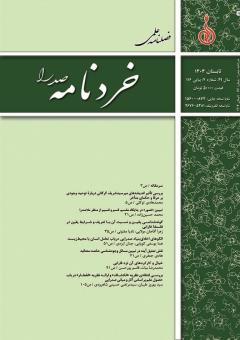خیال و کارکردهای آن نزد فارابی
محورهای موضوعی : مطالعات حوزه فلسفه و حکمت اسلامی
محمدرضا بیات
1
![]() ,
قاسم پورحسن
2
,
قاسم پورحسن
2
![]()
1 - دانشجوی دکتری فلسفه، دانشگاه علامه طباطبائی، تهران، ایران
2 - دانشیار گروه فلسفه، دانشگاه علامه طباطبائی، تهران، ایران
کلید واژه: خیال, کارکردهای خیال, معرفتشناسی, فارابی,
چکیده مقاله :
بسیاری گمان کردهاند بحث از خیال، بعد از شیخاشراق و بعدتر، نزد ملاصدرا بطور جدی مطرح شده است، اما حقیقت اینست که بسیاری از ایدههای مهم در زمینۀ خیال را فارابی پیش کشیده و در میان مباحث وجودشناختی و معرفتشناختی، به مبحث خیال نیز پرداخته است. برخلاف سنت یونانی که خیال در آن وجه معرفتشناسانه نداشت، فارابی برای نخستینبار، و برخلاف افلاطون و ارسطو، به وجه معرفتی آن نیز التفات اساسی پیدا کرده و بسیاری از ساحتها را در پیوند با خیال تبیین و تحلیل کرده است. بنابرین، خیال در منظومۀ معرفتی فارابی کارکردهای متنوع دارد؛ ازجمله: حفظ صور محسوس، تجزیه و ترکیب صور، محاکات، مقایسه، تنظیر، تقلید، تفکر استعاری، تعلیم و تربیت و تأدیب، تحریک بر عمل، رساندن مردم به سعادت، ادراک معانی، بویژه در مسئلۀ رؤیا، وحی و مکاشفات. برخی از این موارد، امروزه در علوم متعدد مورد توجهند. البته اگر خیال ما را از تعقل بازدارد یا جایگزین عقل گردد، نگاه فارابی به آن منفی است، اما سایر کارکردهای خیال در آثار فارابی مثبتند.
Many believe that the problem of imagination was propounded after Suhrawardī and later by Mullā Ṣadrā in a more systematic form. However, the truth is that many of the important ideas concerning imagination were presented by Fārābī, who deliberated over them among his ontological and epistemological discussions. Unlike the Greek tradition, in which imagination lacked an epistemological aspect, and unlike Plato and Aristotle, Fārābī was the first to pay particular attention to its epistemological aspect and explained and analyzed several domains in unity with imagination. Therefore, imagination has various functions in Fārābī’s epistemological system, including protecting sensory forms; the analysis and synthesis of forms; comparison; contrast; imitation; metaphorical thought; education and punishment; provoking act; leading people towards happiness; perception of meaning particularly in relation to the problem of dreams, and revelation and unveiling. Some of these functions are presently receiving great attention in various sciences. Although Fārābī had a negative approach to imagination when it prevents intellection or replaces the intellect, he viewed its other functions positively in his works.
